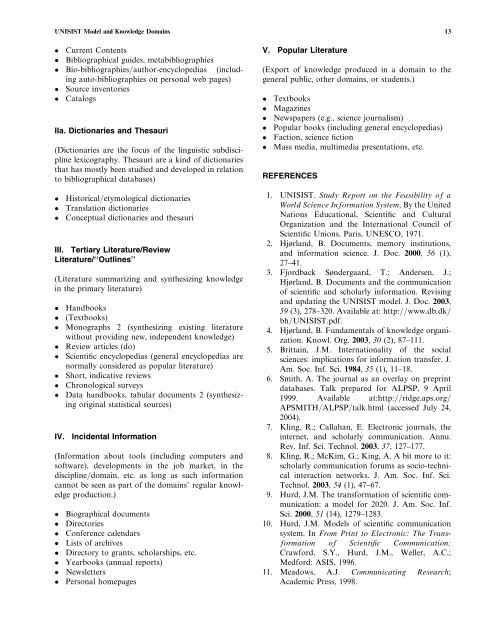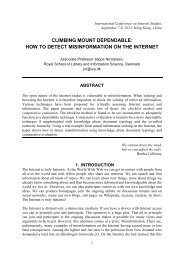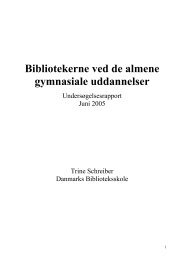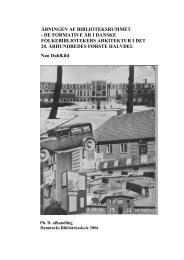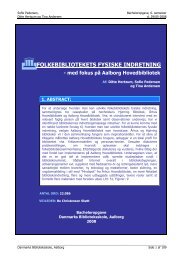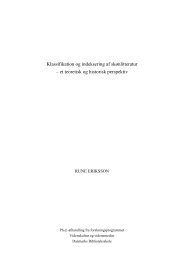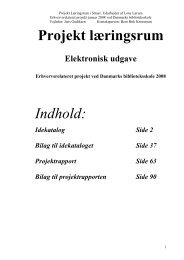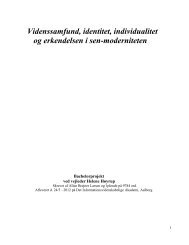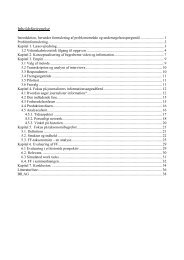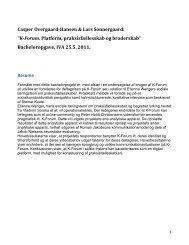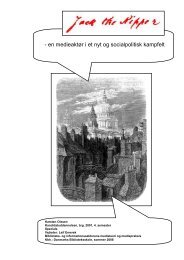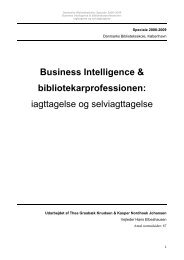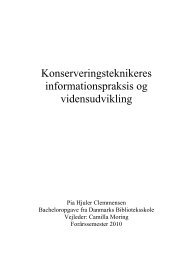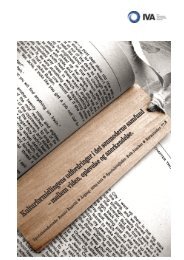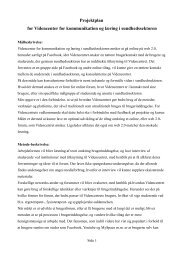UNISIST Model and Knowledge Domains
UNISIST Model and Knowledge Domains
UNISIST Model and Knowledge Domains
You also want an ePaper? Increase the reach of your titles
YUMPU automatically turns print PDFs into web optimized ePapers that Google loves.
<strong>UNISIST</strong> <strong>Model</strong> <strong>and</strong> <strong>Knowledge</strong> <strong>Domains</strong> 13<br />
Current Contents<br />
Bibliographical guides, metabibliographies<br />
Bio-bibliographies=author-encyclopedias (including<br />
auto-bibliographies on personal web pages)<br />
Source inventories<br />
Catalogs<br />
IIa. Dictionaries <strong>and</strong> Thesauri<br />
(Dictionaries are the focus of the linguistic subdiscipline<br />
lexicography. Thesauri are a kind of dictionaries<br />
that has mostly been studied <strong>and</strong> developed in relation<br />
to bibliographical databases)<br />
Historical=etymological dictionaries<br />
Translation dictionaries<br />
Conceptual dictionaries <strong>and</strong> thesauri<br />
III. Tertiary Literature/Review<br />
Literature/‘‘Outlines’’<br />
(Literature summarizing <strong>and</strong> synthesizing knowledge<br />
in the primary literature)<br />
H<strong>and</strong>books<br />
(Textbooks)<br />
Monographs 2 (synthesizing existing literature<br />
without providing new, independent knowledge)<br />
Review articles (do)<br />
Scientific encyclopedias (general encyclopedias are<br />
normally considered as popular literature)<br />
Short, indicative reviews<br />
Chronological surveys<br />
Data h<strong>and</strong>books, tabular documents 2 (synthesizing<br />
original statistical sources)<br />
IV. Incidental Information<br />
(Information about tools (including computers <strong>and</strong><br />
software), developments in the job market, in the<br />
discipline=domain, etc. as long as such information<br />
cannot be seen as part of the domains’ regular knowledge<br />
production.)<br />
Biographical documents<br />
Directories<br />
Conference calendars<br />
Lists of archives<br />
Directory to grants, scholarships, etc.<br />
Yearbooks (annual reports)<br />
Newsletters<br />
Personal homepages<br />
V. Popular Literature<br />
(Export of knowledge produced in a domain to the<br />
general public, other domains, or students.)<br />
Textbooks<br />
Magazines<br />
Newspapers (e.g., science journalism)<br />
Popular books (including general encyclopedias)<br />
Faction, science fiction<br />
Mass media, multimedia presentations, etc.<br />
REFERENCES<br />
1. <strong>UNISIST</strong>. Study Report on the Feasibility of a<br />
World Science Information System, By the United<br />
Nations Educational, Scientific <strong>and</strong> Cultural<br />
Organization <strong>and</strong> the International Council of<br />
Scientific Unions, Paris, UNESCO, 1971.<br />
2. Hjørl<strong>and</strong>, B. Documents, memory institutions,<br />
<strong>and</strong> information science. J. Doc. 2000, 56 (1),<br />
27–41.<br />
3. Fjordback Søndergaard, T.; Andersen, J.;<br />
Hjørl<strong>and</strong>, B. Documents <strong>and</strong> the communication<br />
of scientific <strong>and</strong> scholarly information. Revising<br />
<strong>and</strong> updating the <strong>UNISIST</strong> model. J. Doc. 2003,<br />
59 (3), 278–320. Available at: http:==www.db.dk=<br />
bh=<strong>UNISIST</strong>.pdf.<br />
4. Hjørl<strong>and</strong>, B. Fundamentals of knowledge organization.<br />
Knowl. Org. 2003, 30 (2), 87–111.<br />
5. Brittain, J.M. Internationality of the social<br />
sciences: implications for information transfer. J.<br />
Am. Soc. Inf. Sci. 1984, 35 (1), 11–18.<br />
6. Smith, A. The journal as an overlay on preprint<br />
databases. Talk prepared for ALPSP, 9 April<br />
1999. Available at:http:==ridge.aps.org=<br />
APSMITH=ALPSP=talk.html (accessed July 24,<br />
2004).<br />
7. Kling, R.; Callahan, E. Electronic journals, the<br />
internet, <strong>and</strong> scholarly communication. Annu.<br />
Rev. Inf. Sci. Technol. 2003, 37, 127–177.<br />
8. Kling, R.; McKim, G.; King, A. A bit more to it:<br />
scholarly communication forums as socio-technical<br />
interaction networks. J. Am. Soc. Inf. Sci.<br />
Technol. 2003, 54 (1), 47–67.<br />
9. Hurd, J.M. The transformation of scientific communication:<br />
a model for 2020. J. Am. Soc. Inf.<br />
Sci. 2000, 51 (14), 1279–1283.<br />
10. Hurd, J.M. <strong>Model</strong>s of scientific communication<br />
system. In From Print to Electronic: The Transformation<br />
of Scientific Communication;<br />
Crawford, S.Y., Hurd, J.M., Weller, A.C.;<br />
Medford: ASIS, 1996.<br />
11. Meadows, A.J. Communicating Research;<br />
Academic Press, 1998.


